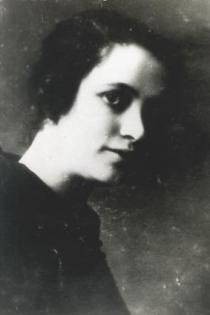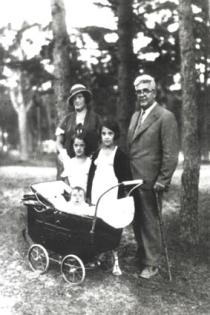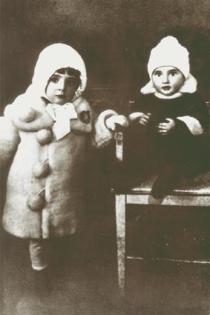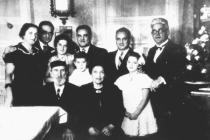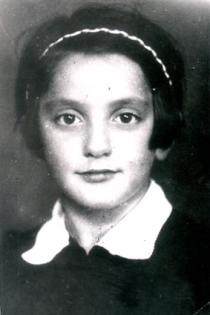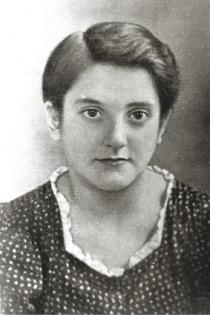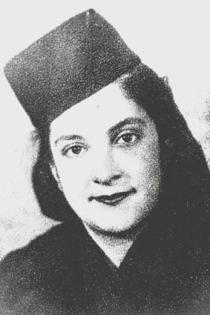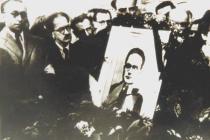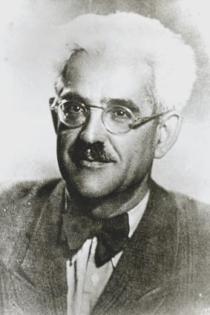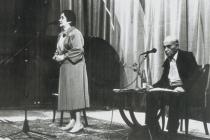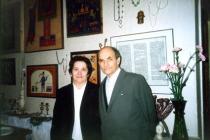This photograph was taken in 1936 and shows my sister and brother. Here I’ll tell you about our childhood.
In my childhood I liked to sing and wanted to become a singer. I sang so much that even had got problems with my throat. I also wrote verses. At the age of 9 I decided to write a novel and bought a thick writing-book. I called my novel Destiny and wrote the name on the book cover. I started with funeral ceremony of a countess: carriages, black curtains, etc. But I gave it up quickly. Anyway I wanted to write all the time. At school we used to have albums where we wrote rhymes to each other. I remember my verses (it is still a pleasure for me): when you become an old woman and an old man is beside you, put on your glasses and read these words. In Lithuanian it was rhymed and sounded well. I also kept a diary since my childhood.
We had a housemaid, though Mom did not work. Sunday was the housemaid's day off; therefore we (together with my elder sister Miriam, who was 3 years older than me) had to clean our rooms ourselves. Being rather little, we had to wash, iron and sew white collars and cuffs to our school uniform. We also were obliged to clean our footwear. If we got up late, our housemaid helped us, but later she terrorized us 'I'll give a report to your Daddy!'
Daddy kept an order everywhere. Mom's chief concern was to feed us. And Daddy used to say 'We have got bread, butter, tomatoes, and salt.' He also told us that we (girls) had to get prepared for future life, to learn to cook from Mom. Daddy worked alone, therefore his financial situation was not very good: he had got 4 children, his family also had a housemaid. I had a younger brother Ruvel (he was born in 1934) and a younger sister Raya (she was born in 1936). When somebody asked Daddy why he had so many children, he always answered he was waiting for a son.
I visited a Jewish kindergarten and later a Jewish junior high school. In 1940 it was closed and I became a pupil of a Lithuanian grammar school. But at home we spoke only Yiddish. I still can write in Yiddish. In ghetto and in fascist concentration camps I kept my diary in Yiddish. Till now I always indicate in different forms that my mother tongue is Yiddish, though I astonish people around me. During the general census [that all-Union national census was carried out in 1989] they asked me about my mother tongue and I said it was Jewish. The employee was surprised and noticed that my husband and I spoke Russian. I explained that we spoke Russian because he was not able to speak Yiddish. The employee was surprised that I knew 3 languages: Yiddish, Lithuanian and Russian. I am not sure that he wrote it down, because filling the questionnaire he used a pencil, and nobody knows what was written there later.
We studied at Lithuanian grammar school together with my sister. At that time people observed traditions and respected religious neighbors. There were manifestations of anti-Semitism (some people blamed Jews for nailing Christ to the cross), but state anti-Semitism did not exist. For instance every Saturday in our grammar school we had the right not to fulfill written tasks, teachers did not ask us. We knew that during the main Jewish holidays we were allowed not to go to school.
At that time at schools pupils were taught religion (before the communists came to power). In our classroom a crucifix hang above the blackboard. In the morning our teacher used to come into the classroom, turn his face to the crucifix and pray. All pupils prayed, too (except us). And after the last lesson the teacher also ordered pupils to pray. A pupil on duty had to say grace. For me it was always funny to listen to Te Deum, if the pupil on duty managed to have got bad marks that day.
They taught us basics of Jewish religion, too (each Friday). All pupils from the 1st till the 8th form had to study it.

